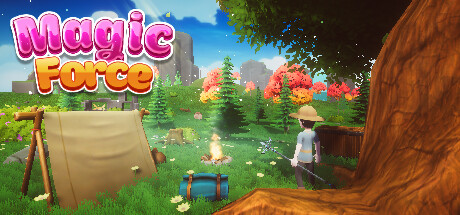
Wands, Wit, and Wanderlust: The Enduring Appeal of Adventure Games with Magic
For decades, the allure of adventure games has captivated players with their intricate puzzles, compelling narratives, and the thrill of exploring fantastical worlds. But when you sprinkle in the potent ingredient of magic, the experience transcends mere escapism and becomes something truly enchanting. Adventure games with magic offer a unique blend of problem-solving, storytelling, and imaginative world-building, providing players with the power to shape their destiny through spellcasting, potion-brewing, and wielding arcane artifacts.
From classic point-and-click adventures to modern narrative-driven experiences, the genre boasts a rich and diverse history. The integration of magic has evolved significantly, mirroring advancements in technology and design philosophy, but the core appeal remains constant: the desire to step into the shoes of a hero, wield extraordinary power, and unravel the mysteries of a magical realm.
A Legacy Forged in Pixels: The Early Days of Magical Adventure
The seeds of magical adventure games were sown in the fertile ground of early computer gaming. Text-based adventures like Zork, released in the late 1970s, laid the groundwork with their descriptive prose that painted vivid pictures of underground labyrinths and the potential for discovering ancient spells. While lacking graphical representation, these games relied heavily on player imagination, prompting them to visualize the magic they wielded and the effects it had on the world around them.
The arrival of graphical adventure games in the 1980s, pioneered by companies like Sierra On-Line and LucasArts, brought the magic to life. Games like King’s Quest and Maniac Mansion introduced simple but effective magical systems. In King’s Quest, players could find and use magical items like enchanted cloaks or powerful wands to overcome obstacles and progress through the story. The focus was often on experimentation and clever application of these magical tools, rewarding players for thinking outside the box.
LucasArts, with their signature humor and focus on character interaction, took a slightly different approach. While their games, such as The Secret of Monkey Island, might not have been explicitly centered around magic, they often incorporated fantastical elements and characters with mystical abilities, adding a layer of whimsy and wonder to the adventure.
These early titles established key elements that would define the genre for years to come. They demonstrated the power of interactive storytelling, the satisfaction of solving intricate puzzles, and the immersive potential of exploring fantastical worlds populated with memorable characters and powerful magic.
The Golden Age and Beyond: Expanding the Magical Toolkit
The 1990s witnessed a golden age for adventure games, and the integration of magic became more sophisticated and nuanced. Games like Gabriel Knight: Sins of the Fathers delved into darker themes, exploring voodoo magic and its connections to ancient cults. This shift towards more mature storytelling and complex magical systems reflected a growing audience and a desire for deeper, more meaningful experiences.
Day of the Tentacle, a LucasArts classic, showcased a more lighthearted approach to magic, with characters accidentally gaining superpowers through exposure to toxic waste. The game’s time-traveling mechanics and interconnected puzzles allowed for creative use of these powers, demonstrating the potential for magic to enhance gameplay and narrative complexity.
The rise of CD-ROM technology allowed for the inclusion of higher-quality graphics, sound, and voice acting, further immersing players in the magical worlds. Games like Lands of Lore: The Throne of Chaos and Discworld benefited immensely from these advancements, creating richly detailed environments and bringing their characters to life with captivating performances.
This era also saw the emergence of hybrid genres that blended adventure game elements with other gameplay mechanics. Quest for Glory: So You Want to Be a Hero, for example, combined adventure game puzzles and storytelling with role-playing game elements, allowing players to customize their character’s skills and abilities, including magical spells. This fusion of genres expanded the appeal of adventure games and paved the way for future innovations.
Modern Magic: A Renaissance of Adventure
While the adventure game genre experienced a period of relative dormancy in the early 2000s, it has seen a resurgence in recent years, fueled by the rise of indie developers and crowdfunding platforms. This renaissance has brought with it a renewed interest in adventure games with magic, resulting in a diverse range of titles that explore new themes and push the boundaries of the genre.
Telltale Games, with their episodic narrative adventures like The Wolf Among Us, demonstrated the power of choice-driven storytelling in a magical setting. Based on the Fables comic book series, The Wolf Among Us allows players to make difficult decisions that impact the story and the fate of the characters, creating a deeply personal and engaging experience.
Daedalic Entertainment, known for their visually stunning and atmospheric adventure games, have also contributed significantly to the genre. Games like The Night of the Rabbit offer a whimsical and enchanting experience, following a young boy as he embarks on a magical adventure through a hidden world.
The rise of virtual reality has also opened up new possibilities for adventure games with magic. Games like The Wizards allow players to physically cast spells using motion controllers, creating a truly immersive and visceral experience. The ability to interact with the magical world in a more tangible way adds a new layer of depth and engagement to the genre.
Modern adventure games with magic are also increasingly exploring more complex and nuanced themes. They often delve into the ethical implications of magic, the consequences of unchecked power, and the challenges of balancing the magical with the mundane. This focus on deeper storytelling and character development elevates the genre beyond simple escapism and allows for more meaningful and thought-provoking experiences.
The Enduring Allure of Magical Adventure
The enduring appeal of adventure games with magic lies in their ability to transport players to fantastical worlds, empower them with extraordinary abilities, and challenge them to solve intricate puzzles. They offer a unique blend of problem-solving, storytelling, and imaginative world-building that resonates with players of all ages.
The magic itself serves as more than just a gameplay mechanic; it’s a metaphor for the power of imagination, creativity, and the ability to overcome challenges. It allows players to feel like they are truly shaping their destiny and making a difference in the world.
As technology continues to evolve, the future of adventure games with magic looks brighter than ever. With the advent of virtual reality, augmented reality, and artificial intelligence, the possibilities for creating immersive and engaging magical experiences are limitless. Whether you’re a seasoned adventurer or a newcomer to the genre, there’s never been a better time to pick up a wand, cast a spell, and embark on a magical journey. The adventure awaits.

